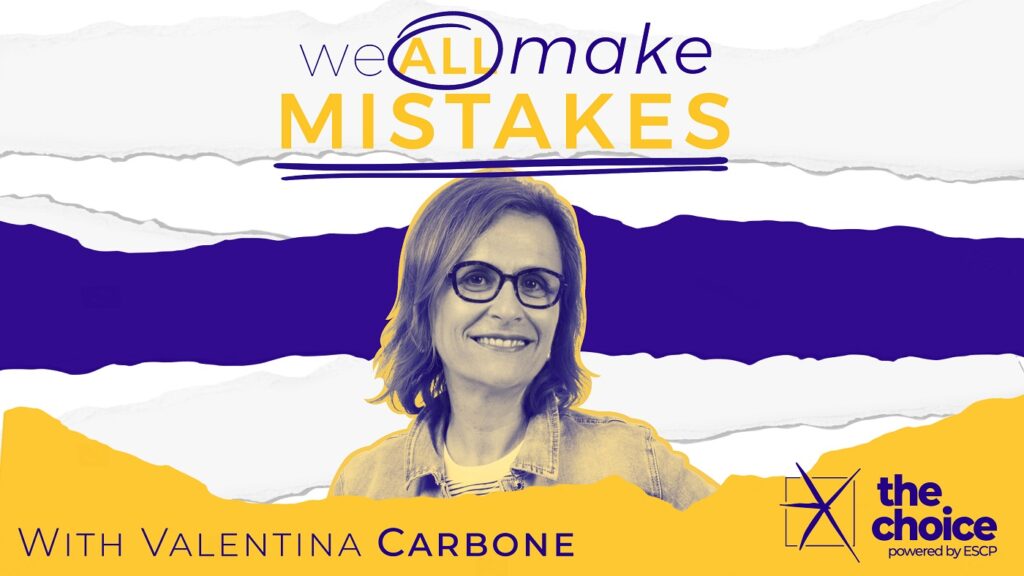In this episode of We All Make Mistakes, Professor Ben Voyer sits down with Valentina Carbone, sustainability professor at ESCP Business School. Carbone, whose research focuses on sustainable supply chain management and the sharing economy, discusses her views on what makes sustainability a complex topic in business, the urgency for radical change, and how companies can avoid common pitfalls when it comes to “going green.” As Carbone highlights, “Sustainability is a daunting task—it’s more than just ticking boxes; it requires systemic transformation.”
Do you want to know more about how businesses can best navigate the sustainability maze? Valentina Carbone’s insights could help you refine your approach and rethink the role of mistakes on your sustainability journey.

Sustainability: not just a KPI, but a philosophy
Many businesses struggle to meaningfully integrate sustainability into their strategies. For Valentina Carbone, one of the core mistakes companies make is to consider it a side goal, separated from their main operations. “We often see companies focusing on marginal improvements, like reducing plastic use by a few percentage points, without addressing the bigger picture,” she explains. “But if the overall volume of plastic on the market is increasing, then the marginal improvements are meaningless.”
Carbone advocates for a more holistic view of sustainability, emphasising that companies must move beyond the siloed, compliance-driven mentality that permeates many corporate strategies. “We need to problematise more,” she says, echoing philosopher Edgar Morin. Rather than rushing into implementing KPIs or technical innovations, corporations should spend more time diagnosing the real challenges they face in this area.
Radical change over perfection
In an era where businesses are frequently accused of greenwashing, Carbone argues that rather than perfection, it’s radicality that will get you further. “Many companies settle for compliance. But what we really need is a shift in the way businesses operate, from a focus on economic returns to a broader, ecocentric perspective. Only then can we start addressing the root causes of our environmental challenges.”
Yet Carbone doesn’t believe that sustainability efforts should be free from criticism. She thinks blame can be a powerful driver for change. “Blaming creates awareness and solidarity. It’s a societal tool, not just a consumer one,” she says. For her, public pressure is vital in encouraging companies to be transparent about their sustainability efforts.
The role of KPIs and innovation
Carbone is sceptical of jumping too quickly towards KPIs or innovation without a clear understanding of the bigger picture. “KPIs can lock companies into certain behaviours too early, before they’ve fully grasped the complexity of sustainability challenges,” she warns. Companies eager to display their green credentials may focus on ticking the boxes, rather than exploring more impactful solutions.
As an example, she points to Lego’s recent decision to stop producing bricks from recycled plastic bottles. While the prior initiative seemed like a win for sustainability, the company eventually admitted that the environmental costs were in fact outweighing the benefits. “They were brave enough to admit their mistake, go back to using virgin plastic, and continue searching for better solutions,” Carbone notes. This, according to her, is a model for how businesses should approach sustainability—by allowing room for learning, experimentation, and adaptation.
Collaboration, not competition
For those eager to make a difference in sustainability, whether as entrepreneurs or within existing companies, Carbone has a clear message: “You are not alone.” She insists on the importance of connecting with like-minded communities and sees collaboration as a key driver for change. “Sustainability shouldn’t be about competing for market share—it’s about tackling a collective challenge. Often, the best solutions come from working together.”
Finally, Carbone leaves the audience with a key principle: alignment. “Find your purpose, and make sure it aligns with your actions, whether as an individual or as a company. Only then will we make real progress.”



